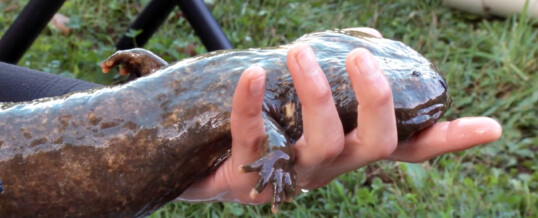
The Hopkins Lab will have 2 graduate research assistantship positions available in 2017
The Wildlife Ecotoxicology and Physiological Ecology Lab at Virginia Tech seeks to fill a Ph.D. and/or M.S. position focused on the reproductive ecology and conservation physiology of an imperiled salamander in Appalachian streams. The student’s research will focus on how habitat quality relates to parental behavior, reproductive physiology, and reproductive success of the eastern hellbender under field conditions. The research will build upon our ongoing pilot work seeking to determine the feasibility of using artificial nest boxes as a conservation/management tool. The student will be encouraged to develop additional areas of related inquiry that complement this core research focus. The successful candidate will work as part of an interdisciplinary team of scientists from several Universities and interact with diverse stakeholders including scientists in multiple state and federal agencies.
The successful candidate will be fully funded (tuition and stipend) for up to 24 months (M.S.) or 48 months (Ph.D.) on a graduate research assistantship, but additional graduate teaching assistantships are also available for students who seek teaching experience. Field and laboratory research expenses are covered for the next 4 years through external state and federal grants and support from the University.
Virginia Tech is in Blacksburg, VA, a college town in an idyllic mountain setting and is the #1 ranked college/university in the U.S. for quality of life (Princeton Review, 8/2016). The Department of Fish and Wildlife Conservation is one of the top five departments at Virginia Tech based on research funding, and is housed in the #1 ranked Natural Resources College in the U.S. (for the second straight year, USA Today, 9/2016).
Qualifications
Applicants should have a strong interest and a prior degree in conservation biology, ecology, physiology or related discipline. Applicants should have extensive past research experience, an outstanding academic record and GRE scores, and evidence of strong writing and quantitative skills. Applicants for a M.S. position will have the option to transition to a Ph.D. position after meeting departmental criteria. Applicants for a Ph.D. position must possess a M.S. degree and experience publishing their research. Ph.D. applicants will also be encouraged to enroll in the Interfaces of Global Change Interdisciplinary Graduate Program http://www.globalchange.vt.edu/igc/ which provides additional training on the role of science in society, science-policy, and science communication.
Start date for the assistantship is negotiable, ranging from January 10th to August 10th, 2017. Deadline for applications for early start dates is November 1st, 2016, and for later start dates is January 15th, 2017. However, applications will be reviewed as they are received.
To apply, please email a single PDF file to Dr. William A. Hopkins at hopkinsw@vt.edu containing (1) a cover letter outlining your research interests, career goals, relevant experience, preference for M.S. or Ph.D. position, and preferred start date; (2) your CV; (3) undergraduate/graduate transcripts and GRE scores; and (4) full contact information for at least 3 professional references. The subject line of the email should read: Reproductive Ecology Graduate Position.
SEP
2016
